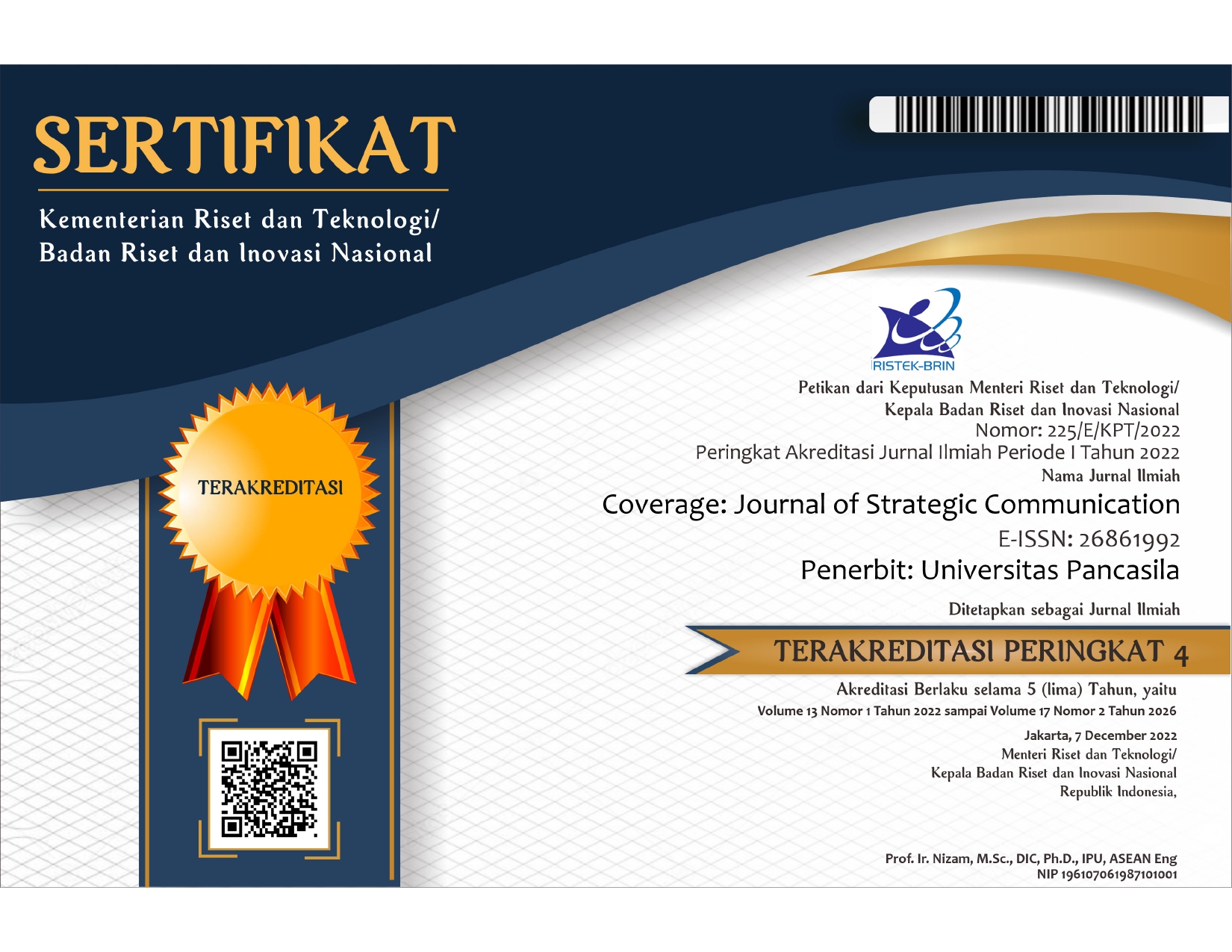Consent, Not Content, as the Central Discourse of Campus Sexual Violence Regulation
DOI:
https://doi.org/10.35814/coverage.v15i1.6281Keywords:
Campus Sexual Violence, Discourse Network Analysis, Policy Communication, Online NewsAbstract
There have been diverse public reactions regarding the Ministerial Regulation on the Prevention and Handling of Sexual Violence in Higher Education. This research aims to map the network coalition of the discourse in news articles published in online media. Five online media outlets were chosen for this study, ofwhich 100 articles were selected. Using the method of Discourse Network Analysis, this study employs a combination of qualitative and quantitative data analysis. This research adopts the Discourse Coalition Framework to analyze the problem by assessing the discourses and network coalitions related to the regulation. The study finds that a discourse coalition formed in favorof the regulation, consisting of universities, government ministries, and human rights organizations. Among the discourses were filling the legal gap related to the prevention and handling of sexual violence in the university, the deterrent effect, and providing a safe learning environment. There was also a discourse that related the regulation to the deliberation of the bill on Sexual Violence Crime, supporting the House of Representatives to pass the bill. On the other side, opposing discourse appeared from religious-based political parties and civil society organizations, particularly related to the consensual aspect of sexual violence. They claimed the regulation contradicted religious values and called for the government to revise it. This study contributes to understanding cross-sectoral discourse development in the context of government regulation and underscores the importance of public policy communication in the early stages of policymaking.
References
Ameral, V., Palm Reed, K. M., & Hines, D. A. (2020). An Analysis of Help-Seeking Patterns Among College Student Victims of Sexual Assault, Dating Violence, and Stalking. Journal of Interpersonal Violence, 35(23–24), 5311–5335. https://doi.org/10.1177/0886260517721169
Anderson, J. C., Boakye, M. D. S., Feinstein, Z., Miller-Walfish, S., Jones, K. A., Chugani, C. D., Schmulevich, A., Jackson, R., & Miller, E. (2022). College students’ experiences of sexual violence and reasons for seeking care in campus health and counseling centers. Journal of American College Health, 1–8. https://doi.org/10.1080/07448481.2022.2057189
Backman, D., Spear, K., Mumford, E. A., & Taylor, B. G. (2020). The Campus Sexual Assault Policy and Prevention Initiative: Findings From Key Informant Interviews. Health Education & Behavior, 47(1_suppl), 75S-84S. https://doi.org/10.1177/1090198120922120
Dagur, R. (2022). Indonesian Supreme Court upholds key sex abuse decree. UNCA News: Union of Catholic Asian News. Retrieved from UCA News (15 June 2022) https://www.ucanews.com/news/indonesian-supreme-court-upholds-key-sex-abuse-decree/97003.
Farisa, F. C. (2021, November 14). Dukungan dan Kontroversi Seputar Permendikbud Ristek Tentang Pencegahan Kekerasan Seksual di Kampus. Kompas.Com. https://nasional.kompas.com/read/2021/11/14/09260501/dukungan-dan-kontroversi-seputar-permendikbud-ristek-tentang-pencegahan?page=all
Gelders, D., Bouckaert, G., & van Ruler, B. (2007). Communication management in the public sector: Consequences for public communication about policy intentions. Government Information Quarterly, 24(2), 326–337. https://doi.org/10.1016/j.giq.2006.06.009
Gómez, J. M. (2022). Gender, Campus Sexual Violence, Cultural Betrayal, Institutional Betrayal, and Institutional Support in U.S. Ethnic Minority College Students: A Descriptive Study. Violence Against Women, 28(1), 93–106. https://doi.org/10.1177/1077801221998757
Gronert, N. M. (2019). Law, campus policy, social movements, and sexual violence: Where do we stand in the # METOO movement? Sociology Compass, 13(6), e12694. https://doi.org/10.1111/soc4.12694
Hajer, M. A. (1993). Discourse Coalitions and the Institutionalization of Practice: The Case of Acid Rain in Britain. In F. Fischer & J. Forester (eds.). The Argumentative Turn in Policy Analysis and Planning(pp. 43-76). Duke University Press. https://doi.org/10.2307/j.ctv1220k4f.5.
Hust, S.J., Marett, E.G, Ren, C., Adams, P.M., Willoughby, J.F., Lei, M., Ran, W., &Norman, C. (2014). Establishing and Adhering to Sexual Consent: The Association between Reading Magazines and College Students‘ Sexual Consent Negotiation. Journal of Sex Research, 51(3), 280–290. https://doi.org/10.1080/00224499.2012.727914.
James, S., & Hetzel-Riggin, M. D. (2021). Campus Sexual Violence and Title IX: What is the Role of Restorative Justice Now? Feminist Criminology, 155708512110626. https://doi.org/10.1177/15570851211062643
Jayani, D. H. (2022, March 10). Kekerasan Seksual di Lingkungan Pendidikan Terus Terjadi, Ini Datanya. Katadata.Co.Id. https://databoks.katadata.co.id/datapublish/2022/03/10/kekerasan-seksual-di-lingkungan-pendidikan-terus-terjadi-ini-datanya
Johnson, E. K. (2017). Erasing the Scarlet Letter: How Positive Media Messages about Sex Can Lead to Better Sexual Health among College Men and Women. American Journal of Sexuality Education, 12(1), 55–71. https://doi.org/10.1080/15546128.2016.1266456.
Kirkner, A., Plummer, S. B., Findley, P. A., & McMahon, S. (2022). Campus Sexual Violence Victims with Disabilities: Disclosure and Help Seeking. Journal of Interpersonal Violence, 37(9–10), NP7156–NP7177. https://doi.org/10.1177/0886260520967149
Kuhlewein, M.& Octaviani, R. (2022). Contesting Culture of Sexual Violence against Indonesian Woman. Retrieved from Tempo (15 June 2022).https://en.tempo.co/read/923858/contesting-culture-of-sexual-violence-against-indonesian-women
Lee, Y-R., Mi, K. & Choi, S. E. (2013). Awareness levels and influencing factors of sexual harassment and gender egalitarianism among college students. Journal of Korean Academic Community Health Nursing, 24(1), 40 - 50.
Mancini, C., Pickett, J. T., Call, C., & Roche, S. P. (2016). Mandatory Reporting (MR) in Higher Education: College Students’ Perceptions of Laws Designed to Reduce Campus Sexual Assault. Criminal Justice Review, 41(2), 219–235. https://doi.org/10.1177/0734016816634787
McMahon, S., Steiner, J. J., Snyder, S., & Banyard, V. L. (2021). Comprehensive Prevention of Campus Sexual Violence: Expanding Who Is Invited to the Table. Trauma, Violence, & Abuse, 22(4), 843–855. https://doi.org/10.1177/1524838019883275
McMahon, S., Wood, L., Cusano, J., & Macri, L. M. (2019). Campus Sexual Assault: Future Directions for Research. Sexual Abuse, 31(3), 270–295. https://doi.org/10.1177/1079063217750864
Patel, U.,& Roesch, R. (2018). Campus sexual assault: Examination of policy and research. Journal of Aggression, Conflict and Peace Research, 10(2), 103–111. https://doi.org/10.1108/JACPR-05-2017-0283
Putri, R.Q.,& Anshari, F. (2023). Internalized Misogyny dalam Cyber Fans di Twitter: Studi Kasus pada Berita Kim Garam dan Kim Woojin. CoverAge: Journal of Strategic Communication, 13(2), 97-111. https://doi.org/10.35814/coverage.v13i2.4405
Richards, T. N. (2019). An Updated Review of Institutions of Higher Education’s Responses to Sexual Assault: Results From a Nationally Representative Sample. Journal of Interpersonal Violence, 34(10), 1983–2012. https://doi.org/10.1177/0886260516658757
Rusyidi, B., Bintari, A., & Wibowo, H. (2019) Pengalaman dan Pengetahuan Tentang Pelecehan Seksual: Studi awal di kalangan mahasiswa perguruan tinggi. Share: Social Work Journal,9(1), 75-85.https://doi.org/10.24198/share.v9i1.21685
Saputra, A. (2022, March 28). Nilai Permendikbud PPKS Legalkan Zina, Lembaga Adat Sumbar Gugat Nadiem ke MA. Detik.Com. Retrieved from https://news.detik.com/berita/d-6004005/nilai-permendikbud-ppks-legalkan-zina-lembaga-adat-sumbar-gugat-nadiem-ke-ma
Suci, P. (2024). Penanganan Ujaran Kebencian terhadap Presiden Jokowi di Media Sosial. CoverAge: Journal of Strategic Communication, 14(2), 146-165. https://doi.org/10.35814/coverage.v14i2.5780
Willmott, T. J., Mathew, A., Saleme, P., & Rundle-Thiele, S. (2022). Participatory Design Application in Youth Sexual Violence and Abuse Prevention: A Mixed-Methods Systematic Review. Trauma, Violence, & Abuse, 152483802210788. https://doi.org/10.1177/15248380221078891
Waterhouse-Watson, D. (2016). News Media on Trial: Towards a Feminist Ethics of Reporting Footballer Sexual Assault Trials. Feminist Media Studies, 16(6), 952–967. https://doi.org/10.1080/ 14680777.2016.1162827.





















